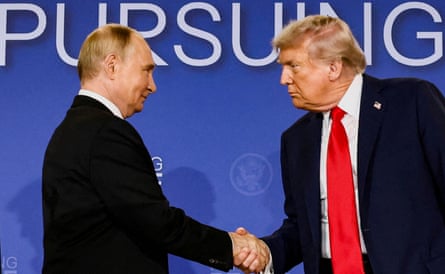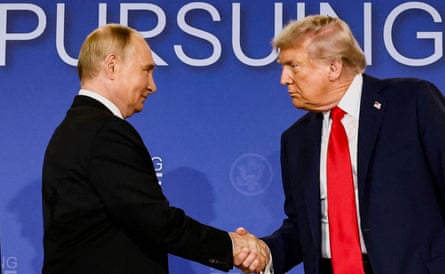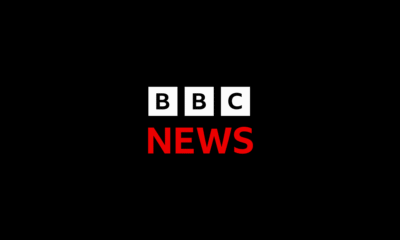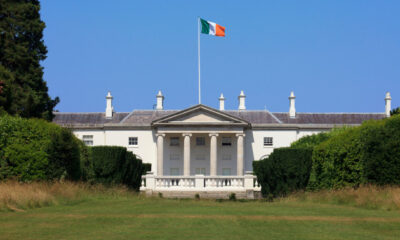Opinion
Trump and Putin are threatening to carve up Europe between them. Suddenly, it all feels a bit 1939 | Simon Tisdall

Read more on post.
For many people in eastern Europe, August 1939 may not feel that long ago. That was the moment Hitler’s Germany and Stalin’s Soviet Union secretly agreed to partition Poland and forcibly subsume the sovereign Baltic republics and Finland into their totalitarian “spheres of influence”. The world knows what came next.
Now the question arises: is it happening again? This time around, it’s Donald Trump’s United States and Vladimir Putin’s Russia making the big geopolitical power-play – and, once again, all of Europe is potential prey. Notwithstanding last week’s sparring over Ukraine, the two leaders’ core aims appear closely aligned.
Physical subjugation of the European continent is not a Trump objective (unlike, perhaps, in Venezuela, Canada or Greenland). But US efforts to dominate the continent through political interference, ideological subversion, economic blackmail, unregulated big-tech predation and the projection of conservative, Christian nationalist cultural beliefs amount to much the same thing.
Putin’s methods are cruder, yet his agenda mirrors Trump’s. He will not let go of Ukraine. He is intensifying, and leveraging, the Russian military threat, from the Baltic states to the Black Sea, including in Moldova, Romania and Georgia. Russian hybrid warfare – sabotage, cyber-attacks, online trolling and disinformation – is now a fact of daily western European life.
Trump, failed coup leader, and Putin, indicted war criminal, are not in formal alliance, yet. They have not agreed a 1939-style Molotov-Ribbentrop non-aggression pact. But there is extensive common ground. Both despise European liberal democracy, equal rights and multiculturalism. Both are viscerally hostile to the EU. Both hanker for past imperial glories; both reject UN “globalism” and international law. Their anti-democratic ultranationalism nurtures foul ideas of ethnic and racial supremacy that most Europeans had long consigned to history.
Trump makes no secret of his desire to normalise US relations with Russia. This, he claims, would lead to vast, mutually beneficial money-making opportunities. When he complained last week that Putin has “let me down”, he was not so much talking about his embarrassing Alaska peace summit flop but about the Russian president’s refusal to cut a deal and cash in.
Trump’s supposed pro-Kyiv shift typifies his pinball policymaking, which ricochets randomly from one wacky idea to another. It will not endure. His warning that Russia faces “big economic trouble” was his way of pushing Putin into doing business while leaving Ukraine and European Nato members to manage the long-term Russian threat alone.
The US president is urging others to cut off Russian oil, but the US itself does nothing. Promised tougher sanctions are all talk. He refuses to resume direct military aid to Kyiv, or punish Russian incursions into Nato territory. In this context, his prediction that Ukraine will somehow regain all its lost territory is cruel mockery.

Trump and Putin’s political pressure campaigns are mutually reinforcing. Both support European hard-right, populist-nationalist parties and politicians. In February, the US vice-president, JD Vance, directly intervened in Germany’s election, siding with the far-right Alternative für Deutschland. Trump’s backing for the Polish presidential candidate Karol Nawrocki may have helped the conservative nationalist score a narrow victory.
Similar Russian influence campaigns, plus dirty tricks and alleged vote-buying, have marred elections in Romania and Moldova, which goes to the polls this weekend. Will Trump and Putin conspire to ensure a hard-right populist succeeds Emmanuel Macron as French president in 2027? It’s a legitimate worry.
Both leaders exploit Europe’s open societies, stirring political pots and promoting favourites. In Trump’s case, one such is Giorgia Meloni, Italy’s rightwing prime minister. Another is British anti-migrant populist Nigel Farage, the quintessential useful idiot. In Putin’s case, it’s pro-Moscow leaders such as Hungary’s Viktor Orbán and Slovakia’s Robert Fico.
The most obvious manifestation of hostile US economic pressure is Trump’s unilateral tariffs, which foreshadowed the summer’s risibly lopsided EU-US trade deal. American big-tech’s £31bn UK investment, announced during Trump’s quasi-regal state visit, carries a whiff of neocolonialism. Buying British is fine. But are US billionaires buying Britain?
after newsletter promotion
Putin is even less subtle. Deniable cyber-attacks cripple key European industries and institutions. An undersea communications cable or gas pipeline mysteriously ruptures. Drones force the closure of airports. Undocumented migrants are directed across EU borders. Online scams proliferate. Methods vary. Yet the economic warfare waged on Europe in tandem by Moscow and Washington is real.
A disturbing report by the European Council on Foreign Relations (ECFR) and European Cultural Foundation claims the US is waging a broad culture war against Europe. Yet its central finding – that Trump is promoting political and ideological allies while simultaneously trying to sideline and divide the EU – applies with equal force to Putin’s Russia.
The defence of “free speech”, mounted by Vance during his infamous Munich security conference attack on Europe’s supposed retreat from “some of its most fundamental values”, is a key cultural battleground. And here is another convergence. For Trump and Putin, speech is free – if they agree with the speaker. But not otherwise. (Ask Jimmy Kimmel, or the late Alexei Navalny.) Trump and Putin: two clowns resembling Laurel and Hardy – except their gags are not jokes.
The ECFR report optimistically suggests the dual assault from east and west is drawing Europeans together. Yet, as ever in Europe, what’s lacking is urgency and strong, united leadership. What’s lacking is clear understanding that this US administration, no longer a trusted friend, is turning into an outright enemy; and that the Russian bear, a species once thought extinct, is back with a vengeance.
The evidence grows. So does the threat. Planned or not, Trump and Putin – like-minded, amoral, authoritarian apex predators – are working together, or at least in parallel, to undercut European democracy, security, prosperity and progressive values. It looks like a concerted pincer movement. It feels like 1939.
-
Simon Tisdall is a Guardian foreign affairs commentator









